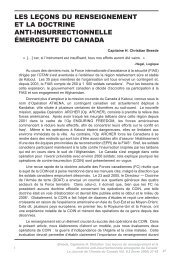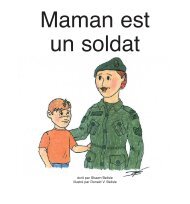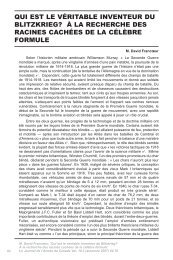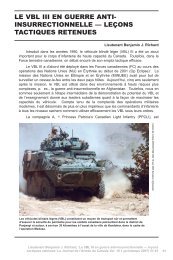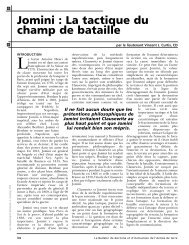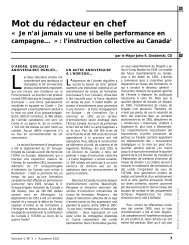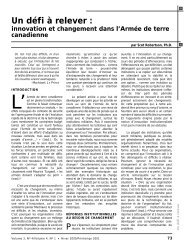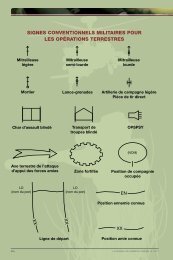The Canadian Army Journal
The Canadian Army Journal
The Canadian Army Journal
You also want an ePaper? Increase the reach of your titles
YUMPU automatically turns print PDFs into web optimized ePapers that Google loves.
62<br />
On a more tangible note, we also need to exploit the opportunities afforded by<br />
tribalism over the pan-Islamic dogma and theory that currently give the insurgency a<br />
portion of its power. Our first course of action needs to be the consistent reinforcement<br />
of the legitimate government of Afghanistan, however this does not always achieve<br />
results in a society with little tradition, respect for, or understanding of a central<br />
government. In cases where this type of situation exists, we should be promoting the<br />
tribe as an entity and source of power, over the village imam or mullah.<br />
Pursuing a different avenue, we also need to stop indirectly funding the Taliban<br />
through our society’s use of illicit drugs, and the purchase of fossil fuels from Saudi<br />
Arabia. <strong>The</strong> dollars that are being spent by our populations and our governments, which<br />
are then ending up in the pockets of the Taliban, are akin to us providing bullets with<br />
which to see our soldiers, diplomats and aid-workers shot. Options that might make this<br />
achievable include purchasing the poppy crop from Afghan farmers ourselves, and either<br />
destroying it or using it for medicinal purposes. Western societies subsidize farmers<br />
throughout their countries; why not subsidize Afghan farmers to the point that they no<br />
longer grow poppy? We could pay them far more than the Taliban to grow nothing, and<br />
even more to grow an alternative crop that could provide sustenance for their families. 70<br />
<strong>The</strong> purchase of fossil fuels is a somewhat more difficult nut to crack, but our<br />
dependence on these fuels, and our purchasing of them from extremist regimes simply<br />
is not a sustainable course of action. Notwithstanding the obvious harm it does to the<br />
environment, we are providing our enemies a vulnerability which can be exploited while<br />
concurrently bankrolling their efforts. We need to undertake concentrated, deliberate<br />
efforts to wean ourselves from this critical element in the Taliban’s ability to continue to<br />
prosecute operations. 71<br />
As previously argued, security needs to continue to be provided, although we must<br />
be wary of attempting to copy the model provided by the Soviet Union, of attempting to<br />
“destroy an idea with firepower.” 72 Though such an approach might remove the<br />
immediate threat, it also contributes to the growth of the next generation of fighters.<br />
Every Taliban we kill leaves behind a mother, father, brother or son who will potentially<br />
become more disillusioned with the legitimate regime and more disposed to take up the<br />
cause that killed his loved one. This lesson is inherent in the conduct of almost every<br />
counter-insurgency over the past two hundred years, and it is one we can ill afford to<br />
ignore. Our use of force has to be less like a bludgeon and far more like a scalpel if it is<br />
to contribute positively to the eradication of the current threat.<br />
Such a fight is going to take time. This caution is ably provided by Thomas<br />
Hammes, who has stated that “we must be prepared for the long-term close-in fight<br />
necessary to destroy [the Taliban] network.” 73 However, the prognosis for success is not<br />
as grim as some might believe. Indeed, author Caleb Car has written:<br />
As long as the Western allies treat those Afghans who strive for progress as<br />
political and moral equals, and accepts the responsibility that years of abusive<br />
behaviour ranging from British imperialism to Soviet expansionism to CIA<br />
meddling have incurred, precedent suggests that those troubles will be<br />
surmounted. 74<br />
This “acceptance of responsibility” should not mean anything other than continuing<br />
to attempt to ameliorate the situation. This can be done through effective use of<br />
diplomacy and development, gaining an understanding of the conditions which lead to<br />
the rise of the Taliban, and holding firm in our resolve to honour our commitments to<br />
solve the problems. As was argued, our first step here needs to be in the provision of<br />
education. As Dr. Sean Maloney has stated:<br />
<strong>Canadian</strong> <strong>Army</strong> <strong>Journal</strong> Vol. 11.1 Spring 2008


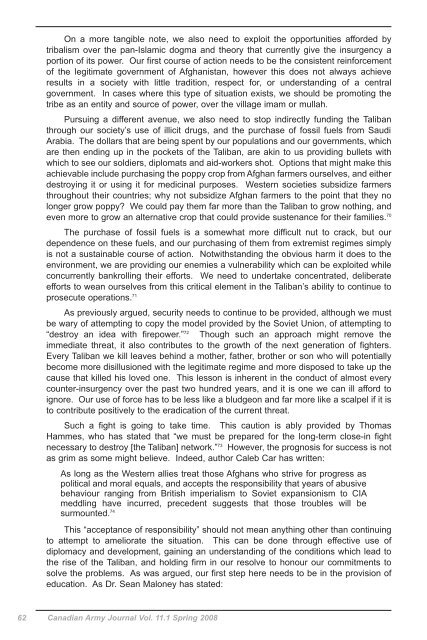
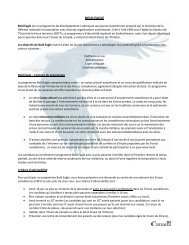
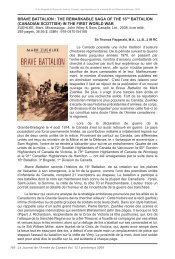
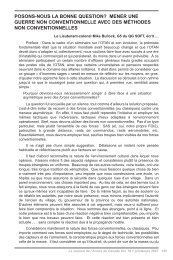
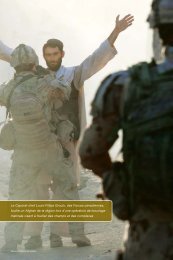
![La modularite dans l'Armee de terre canadienne [pdf 1.6 MB]](https://img.yumpu.com/17197737/1/188x260/la-modularite-dans-larmee-de-terre-canadienne-pdf-16-mb.jpg?quality=85)
